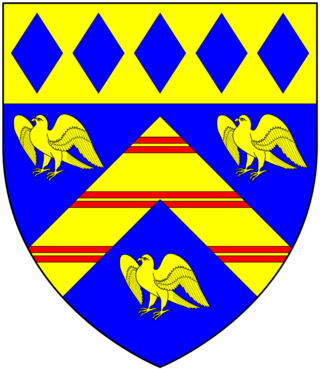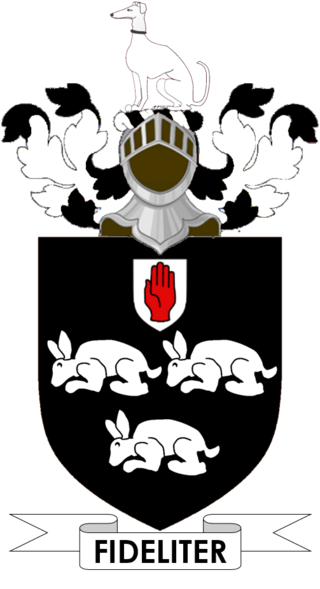
Viscount Massereene is a title in the Peerage of Ireland. It was created in 1660, along with the subsidiary title of Baron Loughneagh. From 1665 to 1816 the Skeffington Baronetcy of Fisherwick was attached to the viscountcy and from 1756 to 1816 the Viscounts also held the title of Earl of Massereene. Since 1843 the peerages are united with titles of Viscount Ferrard, of Oriel and Baron Oriel, both in the Peerage of Ireland, and Baron Oriel, in the Peerage of the United Kingdom. The Viscount also holds the subsidiary titles of Baron Loughneagh (1660) and Baron Oriel (1790) in the Peerage of Ireland and Baron Oriel (1821) in the Peerage of the United Kingdom. As Baron Oriel, he sat in the House of Lords until 1999.

Viscount Hardinge, of Lahore and of Kings Newton in the County of Derby, is a title in the Peerage of the United Kingdom. It was created in 1846 for the soldier and Tory politician Sir Henry Hardinge. His son, the second Viscount, represented Downpatrick in Parliament. His great-great-grandson, the sixth Viscount, succeeded a distant relative as eighth Baronet, of Belle Isle in the County of Fermanagh, in 1986. This title had been created in the Baronetage of the United Kingdom 1801 for Richard Hardinge. He was the third son of Nicolas Hardinge, younger brother of Reverend Henry Hardinge and uncle of the latter's third son Henry Hardinge, 1st Viscount Hardinge. The baronetcy was created with special remainder to the heirs male of Richard Hardinge's father.

Baron Avebury, of Avebury in the County of Wiltshire, is a title in the Peerage of the United Kingdom. It was created 22 January 1900 for the banker, politician and archaeologist Sir John Lubbock, 4th Baronet. He was succeeded by his eldest son, the second Baron. On his death the titles passed to his nephew, the third Baron. He was the son of Harold Fox Pitt Lubbock, fourth son of the first Baron, who died in 1971. The title then passed to the third Baron's first cousin, the fourth Baron, the son of Maurice Fox Pitt Lubbock, sixth son of the first Baron. The fourth baron was a Liberal Democrat politician and one of the ninety excepted hereditary peers who remained in the House of Lords after the passing of the House of Lords Act 1999. He was succeeded by his son, the fifth Baron, in 2016.

Baron Roborough, of Maristow in the County of Devon, is a title in the Peerage of the United Kingdom. It was created on 24 January 1938 for Sir Henry Lopes, 4th Baronet. He had earlier represented Grantham, Lincolnshire, in Parliament as a Conservative. The Baronetcy, of Maristow House in the County of Devon, had been created in the Baronetage of the United Kingdom on 1 November 1805 for Manasseh Masseh Lopes, a member of a wealthy family of Portuguese Jewish origin, with special remainder to his nephew Ralph Franco, son of his sister Maria. Manasseh Masseh Lopes converted to Christianity in 1802, and later represented Evesham, in Worcestershire, Barnstaple in Devon, and Westbury in Somerset, in Parliament. However, in 1819 he was twice convicted of bribing the voters in both Barnstaple and Grampound in order to be elected to Parliament, and was sentenced to imprisonment and heavy fines. He was also unseated by the House of Commons, but after his release from prison he nonetheless got elected for Westbury, a pocket borough which he controlled to a great extent.
This is a list of people who have served as Lord Lieutenant of Louth.
The Chancellor of the Exchequer of Ireland was the head of the Exchequer of Ireland and a member of the Dublin Castle administration under the Lord Lieutenant of Ireland in the Kingdom of Ireland. In early times the office was sometimes called the Chancellor of the Green Wax. In the early centuries, the Chancellor was often a highly educated cleric with knowledge of Finance. In later centuries, when sessions of Parliament had become regular, the Chancellor was invariably an MP in the Irish House of Commons. Walter de Kenley, Chancellor from 1292 until his death, was both a judge of the Court of Common Pleas (Ireland) and a distinguished military commander who gave good service against the Gaelic clans of County Wicklow.

Douglas Clifton Brown, 1st Viscount Ruffside, was a British politician who represented the Conservative Party (UK). He served as Speaker of the House of Commons from 1943 to 1951. Upon stepping down as Speaker he became the Viscount Ruffside; the peerage became extinct with his death.

Elizabeth Christiana Cavendish, Duchess of Devonshire was an English aristocrat and letter writer. She is best known as Lady Elizabeth Foster, the close friend of Georgiana Cavendish, Duchess of Devonshire. Elizabeth supplanted the Duchess, gaining the affections of William Cavendish, 5th Duke of Devonshire and later marrying him. Several of her letters are preserved.
Stubbington House School was founded in 1841 as a boys' preparatory school, originally located in the Hampshire village of Stubbington, around 1 mile (1.6 km) from the Solent. Stubbington House School was known by the sobriquet "the cradle of the Navy". The school was relocated to Ascot in 1962, merging with Earleywood School, and it closed in 1997.

The Welby Baronetcy, of Denton Manor in the County of Lincoln, is a title in the Baronetage of the United Kingdom.
The Lord High Treasurer of Ireland was the head of the Exchequer of Ireland, and chief financial officer of the Kingdom of Ireland. The designation High was added in 1695.

The Cunliffe Baronetcy, of Liverpool in the County of Lancaster, is a title in the Baronetage of Great Britain. It was created on 26 March 1759 for Sir Ellis Cunliffe, a slave trader and Member of Parliament for Liverpool. The fourth Baronet was a General in the Bengal Army. The fifth Baronet represented Flint Boroughs and Denbigh Boroughs in the House of Commons.

The Buckworth, later Buckworth-Herne, later Buckworth-Herne-Soame Baronetcy, of Sheen in the County of Surrey, is a title in the Baronetage of England. It was created on 1 April 1697 for John Buckworth, High Sheriff of London in 1704. The second Baronet sat as Member of Parliament for Weobley. The third Baronet was Assistant Gentleman Usher to George II. The fifth Baronet was Gentleman-Pensioner and Exon of the Guard during the reign of George III. He married Anne, daughter of Paston Herne, of Haveringland Hall, Norfolk, and assumed by Royal licence the additional surname of Herne. The sixth Baronet assumed in 1806 by Royal licence the additional surname of Soame in compliance with the will of Sir Peter Soame, 4th Baronet, of Thurlow. The ninth Baronet was a member of the Shropshire County Council.

Sir Augustus John Foster, 1st Baronet, was a British diplomat and politician. Born into a notable British family, Foster served in a variety of diplomatic functions in continental Europe and the United States, interrupted by a short stint as a member of parliament. He wrote about his American experiences in Notes on the United States of America.

The Pocock Baronetcy, of Hart in the County Palatine of Durham and of Twickenham in the County of Middlesex, was a title in the Baronetage of the United Kingdom. It was created on 18 August 1821 for George Pocock, Member of Parliament for Bridgwater. He was the son of Admiral Sir George Pocock. The title became extinct on the death of the 4th Baronet in 1921.
The High Sheriff of Louth was the Crown's representative for County Louth, a territory known as his bailiwick. Selected from three nominated people, he held his office for the duration of a year. He had judicial, ceremonial and administrative functions and executed High Court Writs.

Sir Philip Magnus, 1st Baronet was an English educational reformer, rabbi, and politician, who represented the London University constituency as a Unionist Member of Parliament from 1906 to 1922. He had previously been appointed director of the City and Guilds of London Institute, from where he helped oversee the creation of a modern system of technical education in the United Kingdom. He was married to the writer and teacher Katie Magnus, and was father of the publisher Laurie Magnus. Laurie predeceased him, and on his own death in 1933 he was succeeded in the baronetcy by Laurie's eldest son Philip.
Before the Acts of Union 1707, the barons of the shire of Elgin and Forres elected commissioners to represent them in the unicameral Parliament of Scotland and in the Convention of the Estates.